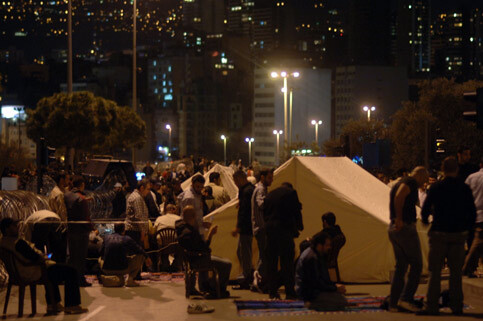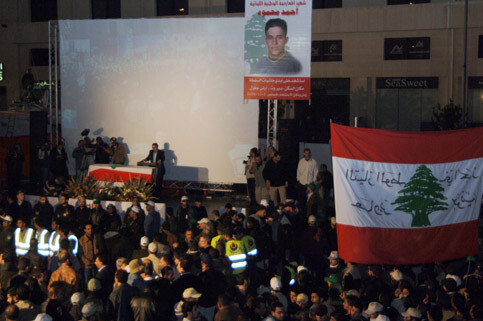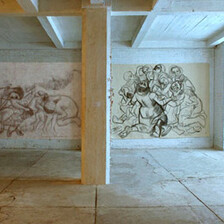Beirut 6 December 2006

Lebanese supporters set up tents close to Prime Minister Fouad Siniora’s office during a protest in downtown Beirut, 1 December 2006. (Dina Debbas/IRIN)
3 Decmeber 2006: Historic Days in Beirut
Today is the third day of the great events in Beirut. A congregation of people, a coming together of individuals from all over Lebanon from all religious groupings, all seeking to change the majority ruling government of the country.
All this is happening under the leadership of Hezbollah, which is being cool, keeping its alliances strong and its supporters disciplined.
On the first day there were approximately two million people. If you were part of it you would not have been able to tell how many people were there. In the front of the event, very near the speakers’ stand where I stood with friends, I could see and hear but only a fragment of the crowd. It was crowded but there was no insane pushing. On departing I felt disappointed that the crowd was not huge. But then I saw on Al Manar television, Hezbollah’s station, scans of the crowd which clearly told me that I was completely mistaken. I must therefore assume that I was among very considerate and polite people and that for so big a crowd there were no incidents of note to my knowledge.
Then people put up tents and stayed overnight. On the next day the crowds again began to swell. At night I did some channel hopping enough to hear the BBC proclaim that hundreds stayed over night to sleep. But then from other reports, I saw and heard that there were hundreds of tents and at least five thousand slept. By the third day, things are growing and growing. Now CNN is said to have described it as Woodstock minus the sex and alcohol. As a friends mentioned, at least they admit it is huge.
People are sleeping, partying, singing, dancing, eating, and generously sharing everything. Toilets have been put up and a very wary security is keeping a sharp eye on everything. The military is at the outskirts with full equipment. In many places, coils of razor wire had been strung up. They remind me of the Israeli checkpoints where I have often been pushed against it by the swelling of crowds mercilessly pushed by the Israeli soldiers. But not here! The soldiers are looking bored. Their presence is mild and non-threatenning.
I have to make special note of the fact that the crowds have been disciplined in amazing ways. They were requested to come to this open sit-down demo without pictures, flags, or other identifying material regarding their political affiliation. They were invited to come with only Lebanese flags and they cooperated. Still yet, some could not resist and party paraphenalia is beginning to make its appearance.
I also want to make special note of the fact that Manar showed us scans of the millions who came to attend. This was unusual as most other stations did their best to minimize the numbers by showing a quick glimse of only one section of the crowd. The crowd filled two squares and many many of the nearby streets and bridges. Feeder marches came from northern Lebanon and the nothern Bekaa valley where the great city of Baalbak is located. People came from Dahye and from the south as well in huge numbers. People came from everywhere.
They used to tell me that in all of Lebanon there are three million people. If that is the case, then two million is a clear majority and they should be respected and their wishes fulfilled. So when you tell this to the naysayer, they say, oh well there actually are four and a half million in Lebanon. Now they begin to tell the truth. Maybe before they forgot to count the Syrians and the Palestinians and people they consider “other.” But two million is still substantial and a majority if one considers that the opposing forces, ten days earlier, only managed to attract approximately 75,000 people to attend the funeral of Pierre Gemayel, best known for his grandfather’s manners, which he embraced, as a murderer of Palestinians. However, the event was described by the Western press as attracting hundreds of thousands, of course!
Now well into the third day, people look like they intend to stay the course till their wishes are fulfilled. Meanwhile, one has to wish them well. Many Lebanese have not had the opportunity to experience nationalist equality. They are enthusiastic for it.

Ahmad Mahmouds coffin (left) was carried to Ryad el Solh square in downtown Beirut, 4 December 2006. He was shot the day before in a Sunni area, the first incident between Shias and Sunnis. (Dina Debbas/IRIN)
5 December 2006: A White Rose
Today I went down again to the great congregation of people. My friends and I took a walk through both Solh and Shuhada squares and were impressed by the size of the encampment. There are at least one thousand tents, growing all the time. People are there with all their needs, resting, socializing, smoking argile (water pipe), eating, strolling, dancing, listening to music, to speeches, and when the time comes, chanting. This is Tuesday night and what we see is people clearly persuaded that they have taken their fate into their own hands and that here and now begins participatory democracy come what may.
Leadership of the alliance resisting the government is being very cautious, very intelligent and very serious. They are handling all things with a level head and with much forethought. The troubling events of Sunday night were, after all, just skirmishes with one young man killed by thugs, not two. Leadership declared that the resistance will not be provoked, that it will only respond by increasing the size of the demonstration.
The first death caused by the great congregation of the Lebanese in the heart of Beirut brought forth respectful ceremony and serious attention. It was a young man called Ahmad who was only 20 years old. He was honored with a massive funeral and a candlelight ceremony. His family, friends, and sweetheart were offered condolences before the huge crowd and by many speakers.
Speakers are urging Siniora to consider that once western allies, the US and Israel, have finished using him and his government, they will toss him aside. They call to him that they are his Lebanese brothers and they offer a rose, a white one not a red one.
The theme of this great and historic event is “we want a clean government.” The chants are: “Siniora, go outside, leave, we want a clean government, a clean government” and, “We are tired of lies, we are tired of tears, we want a government that can stave hunger.” What the alliance leadership, the opposition, is asking for is the formation of a new government, a new parliamentary majority, and early elections. They are demanding that all parties have a right to participate and that elections should be free, open, honest.
It is interesting that religion is playing a very small role in the great event. In fact, we who are here take note that there is much more religion in American demos. We have not heard calls of takbeer nor have we seen any prayers from the podium. Christians and Moslems alike have occasionally said religious phrases of the type that normally permeate discussion everywhere. There are many churches and mosques downtown Beirut and those who wish to pray have places to go and have kept it out of the great demonstration of Beirut.
I wonder what to call this great event in Beirut. I wanted to call it a confluence because people have come here like rivers and the event has a great and natural feeling, like a huge flood or meeting of great rivers. I have never before seen the Arabness of Lebanon so clearly and beautifully expressed and asserted. I have rarely seen such outpouring of friendship between Christian and Muslim Arabs. The balance is wonderful.
Tonight before the candlelight ceremony for the departed shaheed, women in hijab and women with hair flying in the air, danced the dabke together with men, holding hands, chanting to honor the departed hero, placing candles in clusters on the ground, planting a Lebanese flag among them and dancing around them to honor him.
The level of discourse of the demonstrators is highly developed. We have not heard much talk of class but we have heard much of serious analysis. People here are politicized. They have thought of these things and they show an understanding of imperialism. They support the right of the poor and oppressed. They understand that US hegemony is harming them and that Israel is its pawn. They also understand that the US government is different form the American people.
Samia Halaby is a Palestinian artist based in the US.
Related Links





